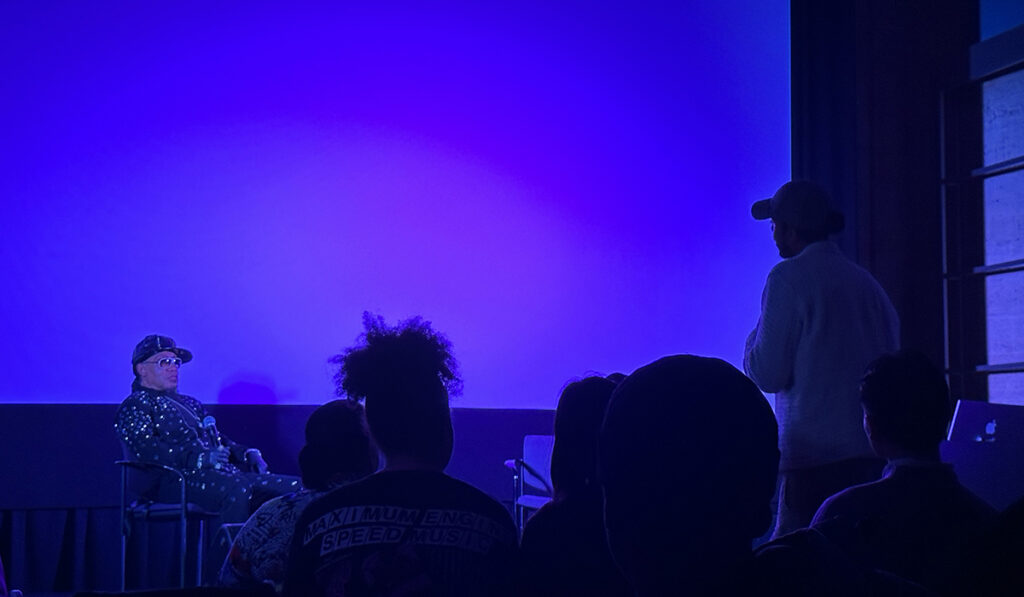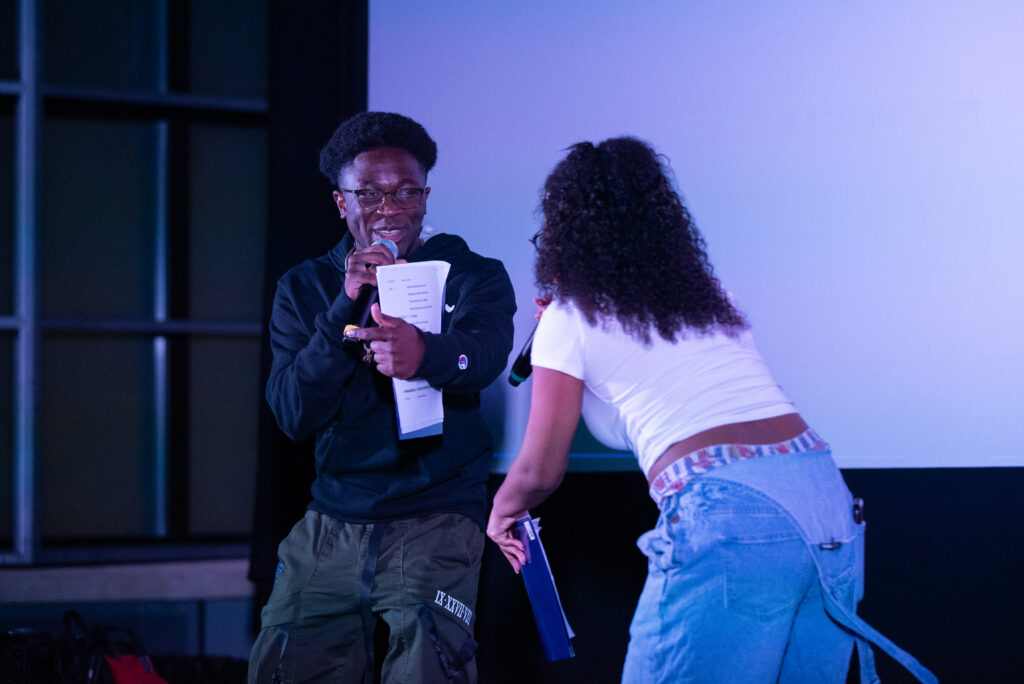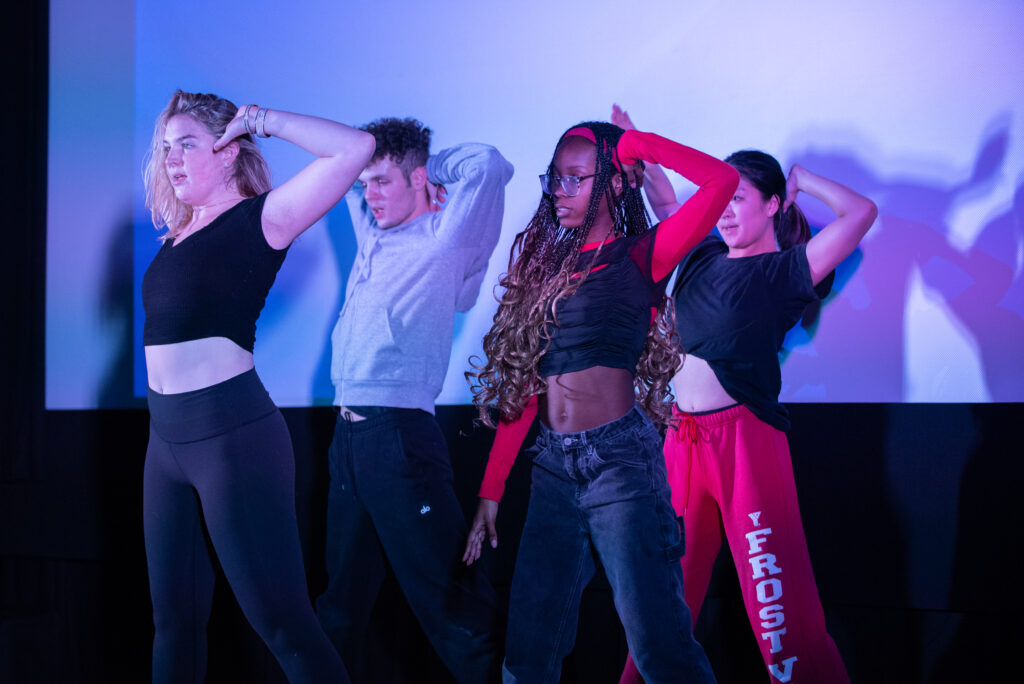Emerson Celebrates 40th Anniversary of ‘The Message’ with Grandmaster Melle Mel

Emerson College hosted hip-hop legend Grandmaster Melle Mel of Grandmaster Flash and the Furious Five on Wednesday, November 30, to celebrate the 40th anniversary of their groundbreaking and influential song “The Message.”
With JayQuan, official historian for the Hip Hop Museum in Washington, D.C., providing historical and cultural context, Melle Mel talked about his early music career, covering hit songs “The Message,” “White Lines,” “Beat Street Breakdown,” and more.
“I’ve said for years, I’m going to get this man’s lyrics into schools,” JayQuan said, pointing to Melle Mel. “Just like Tupac deservingly had his lyrics as a part of curriculum, I’m going to write a curriculum that explains the greatness of this man.”
JayQuan calls the release of “The Message” the birth of socially conscious rap, and it also became the first rap song in the Library of Congress.
“Before ‘The Message,’ rap was highly braggadocious. I drive this kind of car, have these many women. There was really no social commentary in music,” said JayQuan, who this year made a short film, ‘The Message’ is 40, about the song.
The History and Meaning of ‘The Message’
Melle Mel, who came on stage to a standing ovation, told the story of how ‘The Message’ was created.
Other than the final “a child is born” verse, the lyrics to “The Message” were originally written in 1981 by Edward Fletcher, also known as Duke Bootee. Fletcher began pitching the lyrics around Sugar Hill Records, gaining the attention of label founder Sylvia Robinson.
“[Sylvia] was the only one that really believed that that record was going to be anything. They gave [Sugarhill Gang rapper] Wonder Mike a tape and he threw it across the street. Nobody from our group liked it, but she was so adamant about doing this song,” Melle Mel said.
Sylvia made the decision to add Melle Mel’s “a child is born” verse from the 1979 Grandmaster Flash and the Furious Five song “Superrapin’” to the end of “The Message.” Melle Mel had written those lyrics as a teenager in the Bronx.
“I used to watch people. I’d watch junkies. I’d watch my sisters and them when they’d go out dancing. I’d watch my father when he’d come in drinking… The environment that we grew up in gave me the awareness to try to put this into some kind of words,” Melle Mel said.
Dreaming of White Lines, and Influence
Melle Mel also told the story of how he came up with the lyrics for “White Lines.”
“One night I had a dream, and in the dream, I was coming into Roxy – it was a club on 18th Street. So, I’m coming into Roxy and I’m going to meet [Furious Five member] Scorpio, and he’s standing like he would stand on this platform that’s in the Roxy and all the people were taking pictures of him like he was a statue, you know, tripping out, high or whatever,” said Melle Mel.
“When I came in, the song was playing, ‘White Lines,’ the song that I’d wind up writing. So, now I had the idea to write the song because I had the dream… After the record comes out, I’m coming into Roxy, it’s a Friday night, I’m going to meet Scorpio, he’s standing there on the stage, everybody’s taking pictures of him and then the record comes on. That’s how the record came about, it was like déjà vu.”
Emerson Pride
“I am welling up with tears knowing that I got to play a role in bringing the Boston hip-hop community together,” said tamia jordan, Emerson’s director of Intercultural Student Affairs. “ It lifted my heart to the highest to have our students in the mix: MCing, dancing, showcasing their art, hosting the show. But most importantly fellowshipping with the community.”
Kendel Dawson ‘25 and Sydney Rice ‘24 served as hosts for the evening, which was co-sponsored by Emerson’s Office of Student Success, Flawless Brown, 88.9 WERS, and The Secret Society of Black Creatives. DJ Pota-Joe, aka Joe Nalieth ‘24, spun the 1s and 2s, and there were also performances by Emerson student Bryan Edouard, the Emerson Urban Dance Theatre group, and Storm Templeton ‘25.
Boston hip-hop community members including Termanology, Oompa, and Cindy “Mother Hip Hop” Diggs, also performed and spoke separately.
“I got a lot of love for Emerson College. My actual first time on the radio was 88.9,” Termanology said. During his performance, he engaged the audience by shouting “We” and encouraged the crowd to respond “love Emerson.”
“When we think about all of the things that we’re about to hear, these are the lessons that we learned early on,” said Diggs. “ In the 1980s, we didn’t need Nancy Reagan and her saying no to drugs; we had the message delivered to us via ‘White Lines’.”
That’s something Melle Mel, who spoke of the importance of being a socially conscious musician, would appreciate.
“There’s kids out there and whether you want to be a role model or not, they’re looking at you, they’re watching you, they’re going to follow you,” Melle Mel said.
Categories




